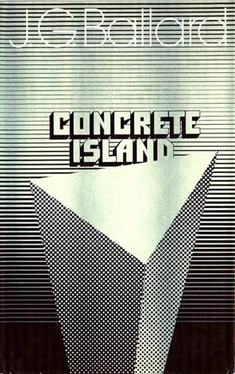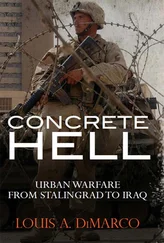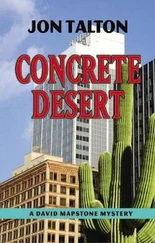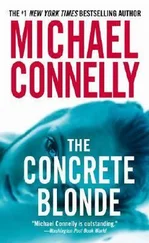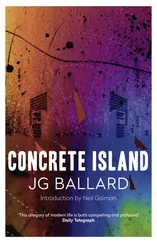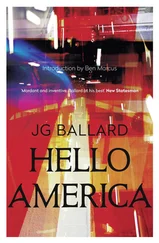1 ...8 9 10 12 13 14 ...30 Maitland crouched in the grass, grateful to this deep bower for hiding him from the approaching figure. He looked at his watch, noticing the date dial at the same moment as an empty car transporter lumbered through the tunnel of the overpass, its diesel braying.
April 24th…
Saturday! The weekend had begun. He had crashed on Thursday afternoon, and had now spent two nights on the island. It was Saturday morning, and this explained the silence and absence of traffic.
Light-headed with relief, Maitland hobbled back to the Jaguar. He drank some water to steady himself. The old man and his motorcycle had gone, hidden somewhere beyond the overpass. Maitland massaged his arms and chest, trying to master his trembling. Had he imagined this solitary figure, conjuring up the spectre of some infantile guilt?
He looked around the perimeter of the island, carefully scanning the embankments in case any falls of food had taken place during the night. Parcels of newspaper, the bright tags of confectionery wrappers – somehow he must find something to eat. The four bottles of Burgundy would keep him going in an emergency, and there must be edible berries growing on the island, perhaps a forgotten allotment garden with a row of wild potatoes.
The caisson of the feeder road indicator sign caught his eye. The rain-washed concrete shone brightly in the sunlight like an empty notice-board. A message scrawled across it in three-feet-high letters would be legible to drivers on the motorway…
Maitland swung himself around the car. He needed writing materials of some kind, or failing that, a tool sharp enough to scratch the concrete so that he could rub dirt into the scored surface.
The stench of burnt rubber and oil hung over the engine compartment. Maitland looked down at the blackened wiring hanging from the distributor. One by one, he pulled the terminals from the sparking plugs and filled his pockets with the burnt rubber guards.
Half an hour later he had crossed the island and was sitting beside the white slope of the caisson. His legs stretched in front of him like ragged poles. The effort of pushing through the long grass had soon exhausted Maitland. At places in the central valley the vegetation rose shoulder-high. Several times he had fallen over the stone walls and brickwork courses hidden beneath the grass, but he picked himself up and doggedly pushed ahead. By now he ignored the nettles that stung his legs through the torn fabric of his trousers, accepting these burning weals in the same way that he accepted his own weariness. By doing so he found he could concentrate on whatever task lay in front of him – the next painful push through a nettle bank, a difficult step across a tilting flagstone. In some way, this act of concentration proved that he could dominate the island.
From the pockets of his dinner-jacket he took out the plug caps and burnt rubber leads he had twisted from the engine. Like a child at play, Maitland set out the pieces of charred rubber in two rows in front of him.
He was too tired to stand, but he could reach to within four feet of the ground. Carefully, in wavering letters eighteen inches high, he marked up his message.
HELP INJURED DRIVER CALL POLICE
Leaning against the cold concrete, Maitland surveyed his handiwork. Like a dying pavement artist in a rich man's cast-off, he pulled the damp dinner-jacket around his thin shoulders. But his hungry eyes soon turned their interest to the cigarette packs, tattered newspapers and refuse lying around him at the foot of the embankment.
Ten feet away from Maitland was a bundle of greasy newspaper, tossed down during the night from a car or truck moving along the feeder road. Cooking oil leaked through the crushed pages. Pulling himself together, Maitland crawled towards the newspaper. He drew the bundle to him with the handle of the crutch. Fumbling in his hunger, he tore open the paper, overwhelmed by the smell of fried fish that clung to the smeary half-tone illustrations. The food had probably been bought by the driver at one of the all-night cafes that formed a small encampment by the southern entrance to the Westway interchange.
All the fish had gone – however, as Maitland had guessed from the neat way the parcel had been wrapped, it still held some twenty fried potatoes.
As he devoured these greasy fingers in his blackened hands, the first rain of the day struck the dust around his legs. Chuckling to himself, Maitland stuffed the paper into the pocket of his dinner-jacket. He lifted himself to his feet and moved away through the deep grass. The roads around the island were deserted again. Carried by a brisk north-east wind, armadas of dark cloud swept overhead. Alone in this concrete landscape, Maitland tottered along, hoping to reach the shelter of his car. He looked back briefly at the letters he had chalked on the embankment, but they were barely visible above the grass.
The rain gusted across him before he could reach the central valley, forcing him to stop and cling to the crutch. Maitland looked down at his waving hands, moving about in a meaningless semaphore as the rain streamed across them. He knew that he was not merely exhausted, but behaving in a vaguely eccentric way, as if he had forgotten who he was. Parts of his mind seemed to be detaching themselves from the centre of his consciousness.
He stopped to search for shelter. The grass seethed and whirled around him, as if sections of this wilderness were speaking to each other. Maitland let the rain lash his face, turning his head so that he could catch the drops in his mouth. Surrounded by the squalls of rain, he was tempted to stand there for ever, and only reluctantly pushed himself forward.
Losing his way, Maitland stumbled into a room-sized enclosure bounded by the nettles growing from the wall-courses of a ruined house. Standing in this stony garden, like the dead centre of a maze, he tried to find his bearings. The heavy rain-clouds hung in dense curtains between himself and the motorway. The mud caked across his dinner-jacket dissolved and ran into streams down his ragged trousers, exposing the blood-stained flank of his right thigh. Confused for a moment, Maitland squeezed his wrists and elbows, trying to identify himself.
'Maitland…!' he shouted aloud. 'Robert Maitland…!'
He clung to the metal crutch and hobbled from the garden. Twenty feet to his left, beyond a pile of galvanized iron sheets, was the ruined entrance to a basement doorway. Maitland vomited into the streaming rain. He wiped the phlegm from his mouth and swung himself over the stony ground. Worn steps ran down to the doorway, where a narrow entrance led under a tilting lintel into the open air.
Maitland dragged the sheets of galvanized iron towards the steps. Laying them carefully between the lintel and the top step, he built a crude roof, adjusting the sheets so that the slope carried away the streaming rain. He threw the crutch down the steps and eased himself under the roof of his new shelter.
Sitting on the steps as the rain drummed at the metal roof over his head, Maitland took off the dinner-jacket and squeezed the sodden fabric in his bruised hands. The muddy water ran away between his fingers, as if he were washing out a child's football gear. He spread the jacket across the steps and massaged his shoulders, trying to draw a little warmth from the pressure of his hands. He could feel his fever returning, fed from the inflamed hip wound. Nonetheless, his success in building even this shabby shelter had revived him, rekindling his still unbroken determination to survive. As he was already well aware, it was this will to survive, to dominate the island and harness its limited resources, that now seemed a more important goal than escaping.
Maitland listened to the rain striking the galvanized iron. He remembered the house his parents had taken in the Camargue for their last summer together. The intense delta rain had fallen on the garage roof below the windows of the bedroom where he had happily spent most of the holiday. It was no coincidence that when he had first taken Helen Fairfax to the south of France they had gone straight to La Grande Motte, the futuristic resort complex on the coast a few miles away. Helen had quietly hated the hard, affectless architecture with its stylized concrete surfaces, nervous of Maitland's buoyant humour. At the time he had found himself wishing that Catherine were with him – she would have liked the ziggurat hotels and apartment houses, and the vast, empty parking lots laid down by the planners years before any tourist would arrive to park their cars, like a city abandoned in advance of itself.
Читать дальше
Конец ознакомительного отрывка
Купить книгу
